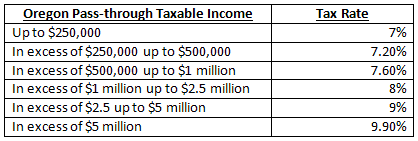
2015 marked the beginning of reduced personal income tax rates in accordance with Oregon House Bill 3601. The bill provides for reduced personal income tax rates on non-passive, flow-through income from S corporations, partnerships, and limited liability companies that are taxed as partnerships. For those who are unaware, this is income ordinarily listed on Schedule E of the individual’s federal form 1040.
It’s important to take note of this change in tax law, as individual taxpayers subject to Oregon personal income tax will be taxed at preferential rates of 7 to 9 percent (versus the top marginal rate of 9.9 percent) on the first $5 million of non-passive income each year. For some taxpayers, this reduced rate can lead to significant savings. Depending upon the level of qualified non-passive taxable income from pass-through entities, the tax rates are as follows:

Several requirements must be satisfied in order to qualify for the reduced rates, including but not limited to:
- Income must be “non-passive,” meaning income other than from a “passive activity” as defined in I.R.C. § 469.
- The electing partner must materially participate in the management of the pass-through entity
- The pass-through entity must employ at least one non-owner, member, or limited partner and
- Qualifying employee(s) must perform at least 1,200 aggregate hours of work in Oregon for the pass-through entity by the close of the tax year for which the reduced rate is allowed, and work hours may be considered only for weeks in which a worker works at least 30 hours.
Taxpayers who have a direct or indirect ownership interest and materially participate in partnerships, S corporations, or limited liability companies should plan to consult with their tax advisors or call Isler CPA and ask for Joseph Lewis or Eric Bell to determine whether you can take advantage of the reduced rates. It may be advantageous for a regular corporation to elect S corporation status, or for an unincorporated business to organize as an S corporation, limited liability company, or partnership. The analysis is potentially complicated for many. The potential payoff, however, can be substantial: an annual reduction in Oregon individual income taxes that can exceed $75,000.
| 
